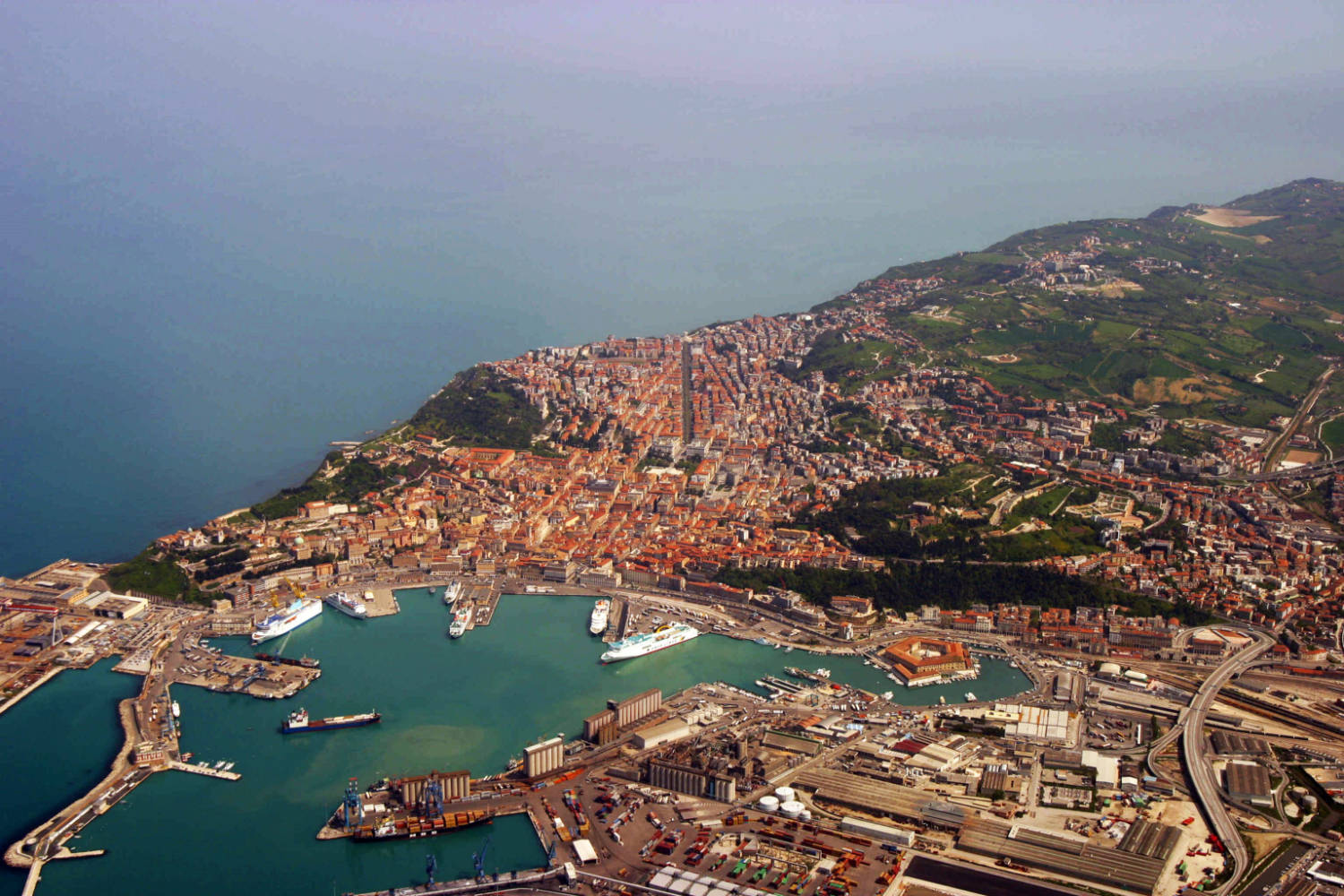- You are here:
-
Home

- Chairmanship
Chairmanship news
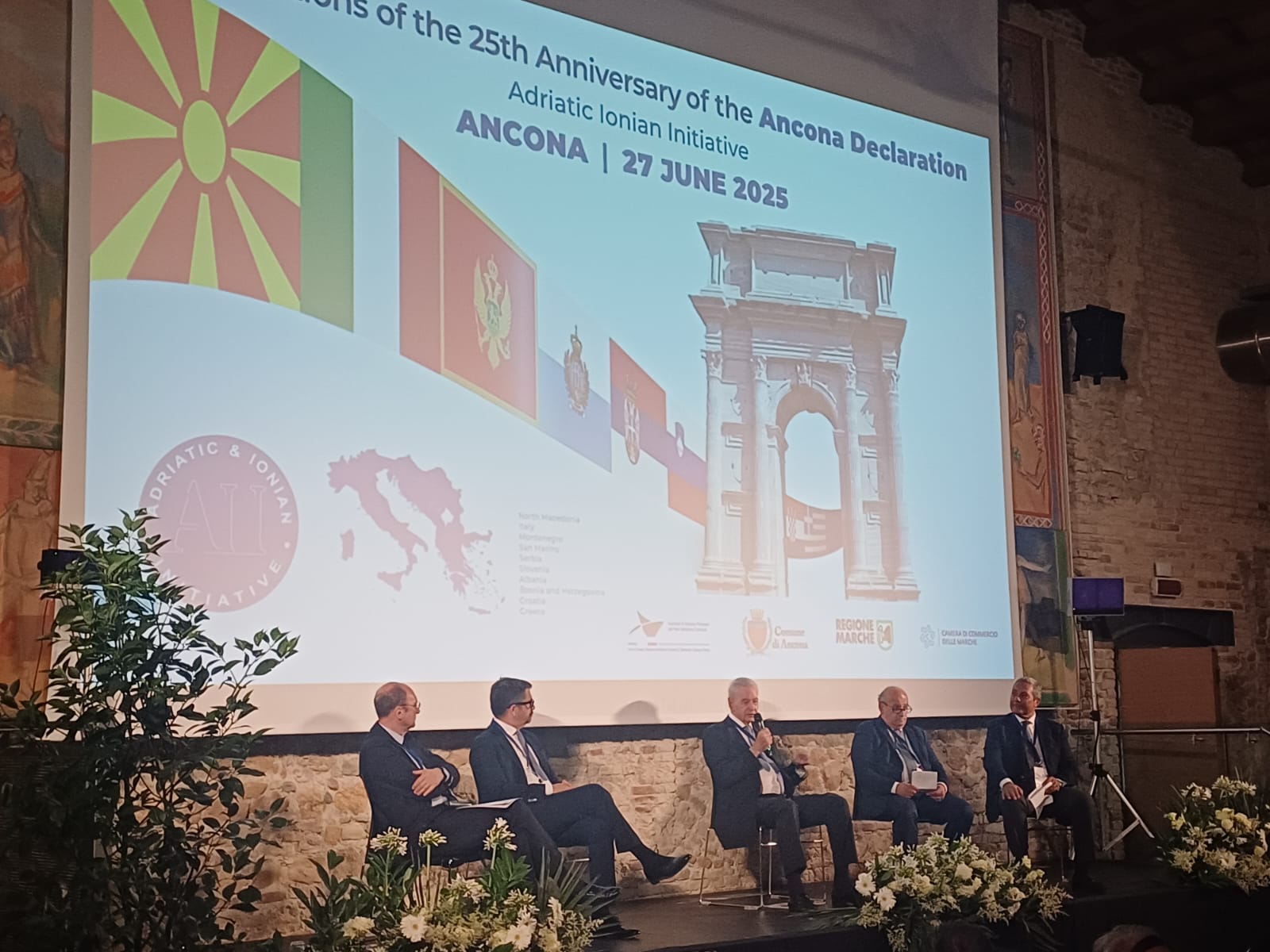
25th ANNIVERSARY OF THE ANCONA DECLARATION - Ancona, 27 June 2025
The historic Mole Vanvitelliana in Ancona hosted on June 27th, 2025 the celebrations for the 25th anniversary of the Ancona Declaration, the foundational act that gave birth to the Adriatic Ionian Initiative (AII) in 2000. The conference, titled "25 Years of the Ancona Declaration: New Horizons and Prospects for the European Union," transcended a mere commemorative event, evolving into an energetic re-launch of commitment towards regional cooperation and European integration in Southeast Europe. From its inception with six founding countries—Albania, Bosnia and Herzegovina, Croatia, Greece, Italy, and Slovenia—the AII embarked on an ambitious journey: to transform a region previously marked by conflicts into an area of peace, growth, and sustainable development, strongly aligned with the European Union's enlargement policy. Today, having expanded to include Serbia, Montenegro, North Macedonia, and San Marino, the Initiative continues to play a strategic role in fostering stability, connectivity, and development, reinforcing the vision of an Adriatic-Ionian area deeply anchored to the European project. Marco Ansaldo, scientific advisor of "Limes" and the event's moderator, underscored the Adriatic's geopolitical centrality, describing it as a "globe in miniature," a crossroads of cultures requiring robust political support for its stability and for the ongoing EU enlargement process. -------------------------------------------------------------------------------- Welcome Addresses: Ancona – A Bridge and Symbol of Unity The day commenced with a powerful chorus of institutional voices, emphasizing Ancona's and the Marche Region's pivotal roles within this macro-region. Daniele Silvetti, Mayor of Ancona, underscored Ancona's strategic role as a bridge to the Western Balkans, promoting international dialogue and cooperation rooted in the 1999 "Charter of Ancona" which laid the groundwork for shared peace and development and for the establishment of the Forum of the Adriatic Ionian Cities. Ambassador Giovanni Castellaneta, AII Secretary General, reflected on the Initiative's 25 years of success in pacifying the region and fostering development, advocating for swift Western Balkans' EU integration as a "historic responsibility" and a "fusion of countries with shared history and civilization". Francesco Acquaroli, President of the Marche Region, affirmed the Marche's political and geographical centrality in the macro-region, pledging to strengthen institutional collaboration and advance economic and cultural development for future generations. He noted the tangible results of the regional strategy over 25 years. Gino Sabatini, President of the Marche Chamber of Commerce, emphasized the strategic importance of economic cooperation and data (from the DO-AIR Observatory) for public and private decisions, showcasing the Chamber's role in promoting trade and connectivity. He cited a significant increase in intra-area exports, from 50 to 80 billion euros since 2014. Finally, Vincenzo Garofalo, President of the Central Adriatic Port Authority, illustrated the crucial role of maritime and terrestrial infrastructure in connecting the two sides of the Adriatic-Ionian, viewing these as foundational for peace, economic growth, and European integration, and highlighting Ancona's historical vocation for dialogue. -------------------------------------------------------------------------------- Session I – EU Policies and Enlargement: The AII as a Strategic Instrument for Integration This session brought together high-level institutional voices to assess the evolving European perspective on enlargement and regional cohesion, firmly placing the AII at its strategic core. A key message resonating throughout was that EU enlargement is a strategic imperative for Europe's security and identity, requiring not only political will but also substantial investment in infrastructure and economic and social cohesion. The AII, as many speakers underlined, acts as a crucial facilitator in this process. Maria Tripodi, Italian Undersecretary of State for Foreign Affairs and International Cooperation (via video message), confirmed Italy's unwavering commitment to the European integration of the Western Balkans, recognizing the AII as a fundamental instrument for promoting EU values and standards. She highlighted Italy's upcoming AII Chairmanship in May 2026 as a moment to reaffirm this strategic priority and historical responsibility. Similarly, Tommaso Foti, Italian Minister for European Affairs, Cohesion Policies, and PNRR (via video message), defined the AII as a strategic tool for European integration, asserting that enlargement demands not only political will but also substantial investments, infrastructure, and economic/social cohesion. He referred to the Western Balkans as the "geographical and geopolitical heart of Europe". From the European Commission, Dubravka Šuica (via video message) stressed the strategic importance of regional cooperation and sustainable development in the area, promoting partnerships and investments in education, culture, and security amid global uncertainties. Raffaele Fitto, Executive Vice-President of the European Commission for Cohesion and Reforms (via video message), insisted on a simpler, more flexible, and results-oriented cohesion policy, vital for sustainable development and the integration of the Western Balkans into the EU, noting the potential for their economies to double in the next decade. Antonella Sberna, Vice-President of the European Parliament (via video message), expressed the EP's support for AII activities, emphasizing flexible EU policies that respond to local needs and translate into funds and opportunities for direct territorial engagement. Representatives from AII participating countries further reinforced these themes. Luca Beccari, State Secretary of San Marino, reaffirmed San Marino's commitment to greater European integration, highlighting how AII membership was a precursor to structured agreements with the EU and underscored the need for concrete connectivity projects, especially for smaller entities. Zrinka Raguž, State Secretary of Croatia, promoted macro-regional cooperation as an effective framework for governance and enlargement, with a particular focus on social inclusion and active youth involvement as essential partners for a common European future. Periša Kastratović, State Secretary of Montenegro, presented Montenegro as an active and advanced partner in the EU accession process, underscoring its commitment to sustainable development and the credibility of the enlargement policy, with a clear aim for 2028 accession based on merit. Matej Zakonjšek, Director of the Transport Community, reiterated the urgency of integrating the Western Balkans into the European transport network, insisting on modernizing railway infrastructures to facilitate economic and human connections and viewing connectivity as a broad, integrated network. Finally, Carlo Ciccioli, Member of the European Parliament, positioned the Marche region as a strategic epicenter for growth and WB integration into the EU, advocating for increased EU funds for the blue economy and the valorization of Ancona's port, drawing on the region's historical significance. -------------------------------------------------------------------------------- Session II – Cohesion and Cooperation in the Adriatic Ionian Region and the Western Balkans Moderated by Prof. Mario Baldassarri, President of ISTAO, this session delved into the practicalities of translating macro-regional strategies into concrete, funded projects, underscoring the critical role of territorial cooperation and infrastructure investments for deepening integration. The overarching message was clear: effective cohesion requires moving beyond declarations to tangible action and robust financial backing. Luigi Paoli Puccetti, representing the Italian Ministry of Foreign Affairs and International Cooperation, highlighted Italy's historical merit in supporting Western Balkans enlargement, advocating for gradual integration through concrete infrastructure projects in connectivity, energy, and digitalization. He emphasized extending single market benefits to these countries even before full accession. Conversely, a stark warning came from Miloš Prica, representing the Ministry of Foreign Affairs of Bosnia and Herzegovina, who expressed deep concern over delays in the Western Balkans' EU integration process, cautioning against growing youth disillusionment and the geopolitical dangers of leaving a "black hole" in Europe's heart amidst rapid global changes. The session then turned to the strategic frameworks for development. Sergio Garribba, EUSAIR Pillar 2 Coordinator for Energy, outlined EUSAIR's long-term vision for decarbonization and energy security, promoting trans-Balkan energy corridors and a transition towards more sustainable economies by 2050, stressing the importance of electricity grids. Complementing this, Pierluigi Coppola, EUSAIR Pillar 2 Coordinator for Transport (joining online), presented the three pillars of the transport masterplan – railway development and intermodality, "green and smart" ports, and sustainable urban mobility – as key to improving connectivity and quality of life across the region. Lodovico Gherardi, Coordinator of the IPA-ADRION Programme Managing Authority, illustrated the fundamental role of the IPA-ADRION program in financing territorial cooperation projects, having managed significant resources (113 million euros for 2014-2020 and 160 million for 2021-2027). He highlighted the high demand for resources and the imperative to safeguard these programs against geopolitical risks. Antonio Verrico, from the Italian Department for Cohesion Policies, further elaborated on the effective utilization of cohesion policy funds for the Adriatic-Ionian strategy, highlighting progress in European territorial cooperation and a focus on fostering a greener and more socially inclusive Europe, including the establishment of a social pillar in EUSAIR. Finally, Vassilis Kessidis, a Strategic Consultant, described the Marche region as a replicable model of operational macro-regional cooperation. -------------------------------------------------------------------------------- Session III – Civil Society as a Driving Force of European Integration The afternoon session gave a compelling voice to the vibrant ecosystem of networks operating under the AII umbrella, collectively emphasizing that bottom-up cooperation through civil society organizations is indispensable for fostering a shared regional identity, promoting people-to-people connections, and addressing the tangible needs and aspirations of the macro-region's citizens. Lidija Pansegrau Hadrović, AII/EUSAIR Senior Official focused on Youth Involvement, emphasized the crucial role of youth as a driving force for democratic resilience and regional transformation. She advocated for their active inclusion in decision-making structures through initiatives like the EUSAIR Youth Council, urging a greater responsiveness to young people's concerns about issues like housing and climate change. Eleonora Tramannoni, Secretary General of the Forum of Adriatic Ionian Chambers of Commerce, stressed the importance of bottom-up cooperation and economic data from the DO-AIR Observatory for guiding policies and business opportunities. She showcased significant growth in intra-regional trade, demonstrating the Chambers' role in concrete economic development and advocacy. Andrea Perna, Secretary General of UniAdrion, discussed the vital role of universities in building trust and promoting youth mobility and academic cooperation. He underlined the need to optimize resources and improve communication to actively engage the millions of people within the academic sphere across the region, highlighting mobility programs like Erasmus Plus. Marta Paraventi, Secretary General of the Forum of Adriatic Ionian Cities, posited culture as a fundamental element for consolidating growth and European integration. She proposed a project for European civic education in schools to engage younger generations in shared history and values, drawing on the rich cultural heritage that unites the Adriatic-Ionian cities. Umberto Trenta, Senior Advisor of the Marche Region and Ancona Municipality, called for cohesive and politically-guided institutional action, urging the overcoming of bureaucratic divisions to effectively implement regional laws and involve youth in the macro-region's vision. He stressed the importance of a unified political approach over fragmented efforts. Concluding the civil society contributions, Ivan Rizzi, President of the Institute for Advanced Strategic and Political Studies (IASSP), insisted on the necessity of strategic intelligence and bold choices to navigate the challenges of the "post-global" era. -------------------------------------------------------------------------------- The Future of the Ancona Declaration in a Changing International Environment The conference concluded with a forward-looking vision, emphasizing the AII not just as a forum for dialogue but as a vehicle for concrete action. The discussions culminated in a powerful call for urgency regarding Western Balkans' EU accession, balancing strategic prudence with the recognition of evolving geopolitical dynamics. Ambassador Fabio Pigliacopo, Head of the AII Permanent Secretariat, delivered a poignant summary, emphasizing the urgency of accelerating Western Balkans' EU accession. He warned of growing youth disillusionment and the significant geopolitical danger of leaving a "black hole" in Europe's heart. Critically, he acknowledged the increasing complexity posed by foreign actors. He underscored that prolonged delays in accession could lead to these countries being influenced by other powers, creating a dangerous situation for Europe. He reiterated the AII's role as a vital political forum to push for these integrations. Carlo Ciccioli, Member of the European Parliament, in his concluding remarks, urged a transformation of cooperation into concrete political action, calling for leveraging the European Parliament's influence to secure funds and promote strategic projects. He stressed the importance of culturally and politically integrating the Western Balkans, highlighting the critical role of grassroots engagement and communication in this process. Italy, scheduled to assume the AII Chairmanship in May 2026, views this as a symbolic moment to reaffirm its foundational commitment and lead an ambitious and tangible agenda for the future. The Ancona Declaration, born in a time of both conflict and hope, remains a vital blueprint for stability, partnership, and integration. As the Adriatic-Ionian region continues to evolve amidst new global challenges and the EU prepares for its next phase of enlargement, the AII stands ready to chart a common course towards a more united, peaceful, and prosperous Europe. The collective commitment is clear: to translate shared aspirations into tangible progress for the next quarter-century and beyond.
Read more: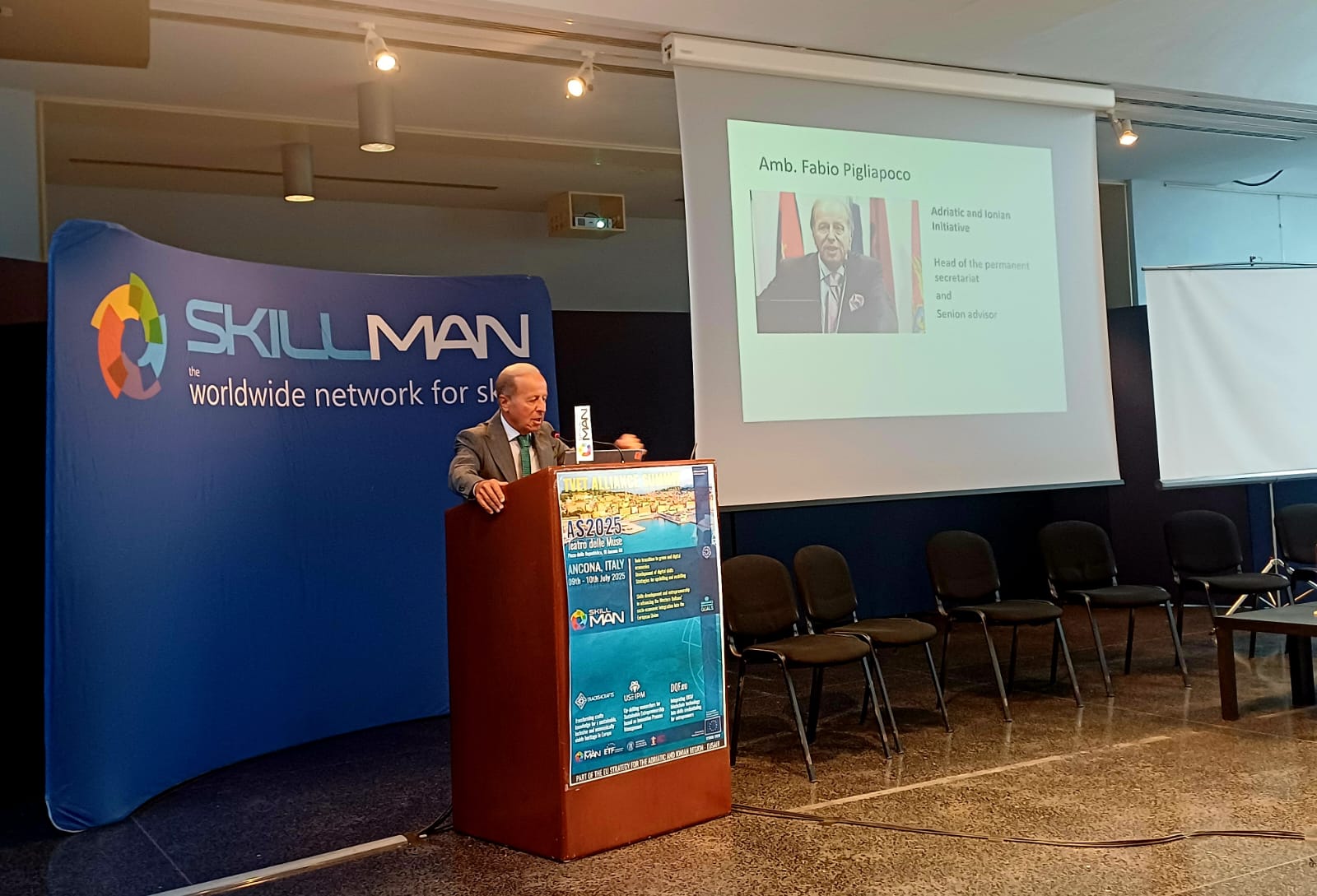
Ambassador Pigliapoco at the TVET Alliance Summit 2025 – Ancona, 9 July 2025
On 9–10 July 2025, Ambassador Fabio Pigliapoco, Head of the AII Permanent Secretariat, took part in the TVET Alliance Summit 2025, organised in Ancona by the Skillman Network, in collaboration with the Marche Polytechnic University and a wide range of academic and institutional stakeholders. The conference, held under the theme “A skills system that empowers people and societies: Future-fit education and training for sustainable development”, explored how Technical and Vocational Education and Training (TVET) can contribute to innovation, resilience, and regional cooperation. In his welcome address during the Opening Session, Ambassador Pigliapoco underlined the importance of aligning skills development with the priorities of the EU Strategy for the Adriatic and Ionian Region (EUSAIR) and highlighted the relevance of the ongoing North Macedonian Chairmanship of the Initiative. The Summit gathered representatives of the European Commission, ministries, universities, chambers of commerce, youth councils, and international organisations. The debates unfolded through three main sessions: Plenary Session 1 – Aligning Skills Development with EUSAIR Priorities: the Skillman Teacher Academy model, exploring how skills strategies can match macro-regional objectives. Plenary Session 2 – The Role of Entrepreneurship Education in Regional Development, focusing on entrepreneurial competences as drivers of sustainable growth. Plenary Session 3 – Educational Excellence for Lifelong Learning: the coves.eu model, showcasing Centres of Vocational Excellence as engines for innovation and inclusion. With its strong link to EUSAIR and to the priorities of the Adriatic-Ionian Region, the TVET Alliance Summit provided a valuable opportunity to strengthen cooperation between EU and Western Balkan partners, advancing shared objectives in education, employment, and regional development.
Read more: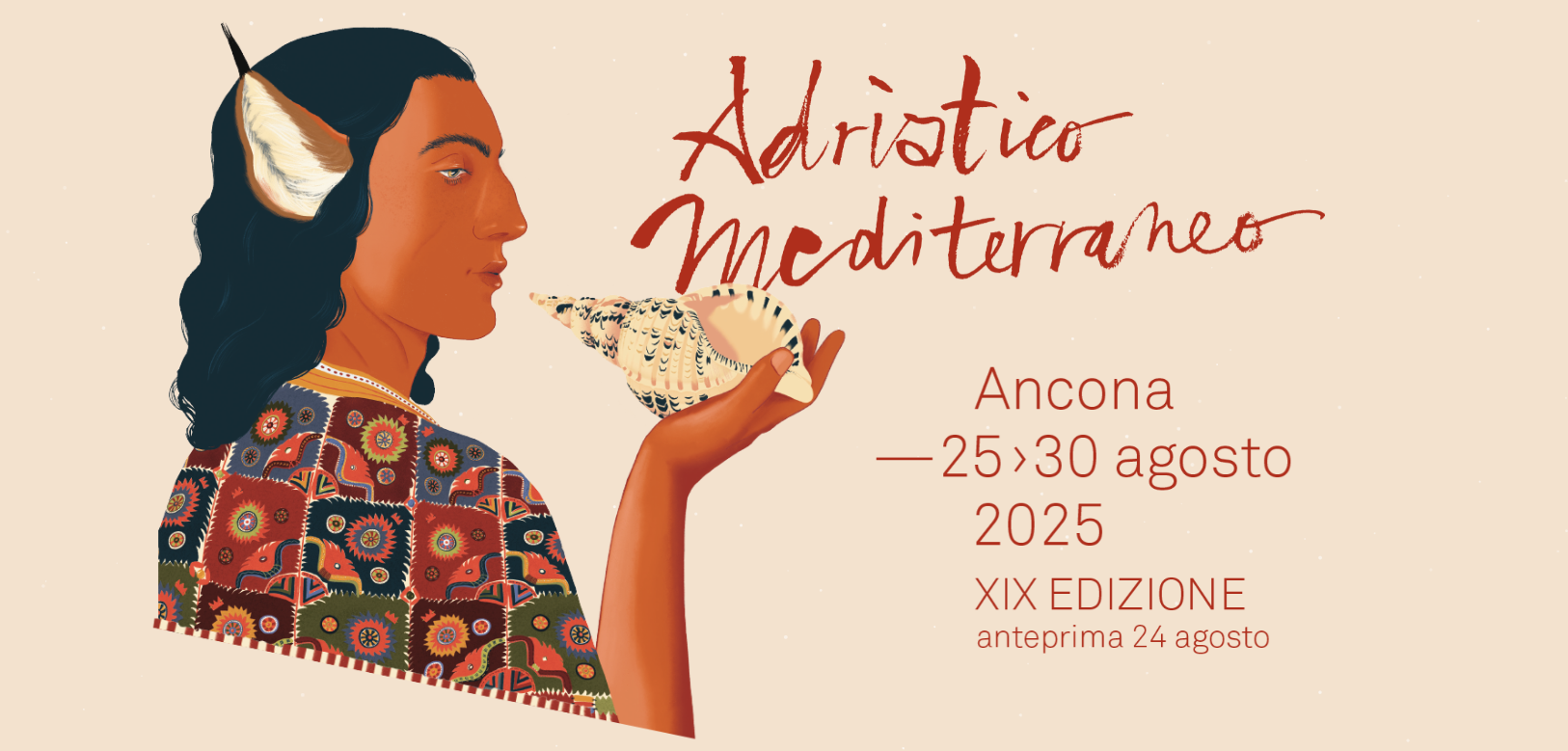
XIX Adriatic Mediterranean Festival - Ancona, 25-30 August 2025
The XIX edition of the Adriatic Mediterranean Festival took place in Ancona from August 25 to 30, 2025, once again bringing to the city a rich programme of concerts, performances, seminars, and cultural encounters. This year’s focus was dedicated to North Macedonia, the country holding the Chairmanship of the Adriatic Ionian Initiative and of the EU Strategy for the Adriatic and Ionian Region (EUSAIR) since June 1, 2025. Among the many events, special attention was given to the talk with Boban Pesov, illustrator, YouTuber and author, who presented his first graphic novel C’era una volta l’Est, in dialogue with journalist and Limes scientific advisor Marco Ansaldo. On the music stage, the internationally renowned Džambo Aguševi Orchestra, led by the “funky tiger” Džambo Agušev – the most acclaimed trumpet player of the Balkans – performed the exclusive national premiere of The Beat of Brass-Heart at the Roman Amphitheatre. As in previous years, the Festival highlighted the strong partnership with the Adriatic Ionian Initiative, whose Permanent Secretariat is based in Ancona, and paid tribute to its 25 years of commitment to fostering regional cooperation across the Adriatic-Ionian area. You can download the full programme in PDF.For more information, please visit the official Festival website.
Read more: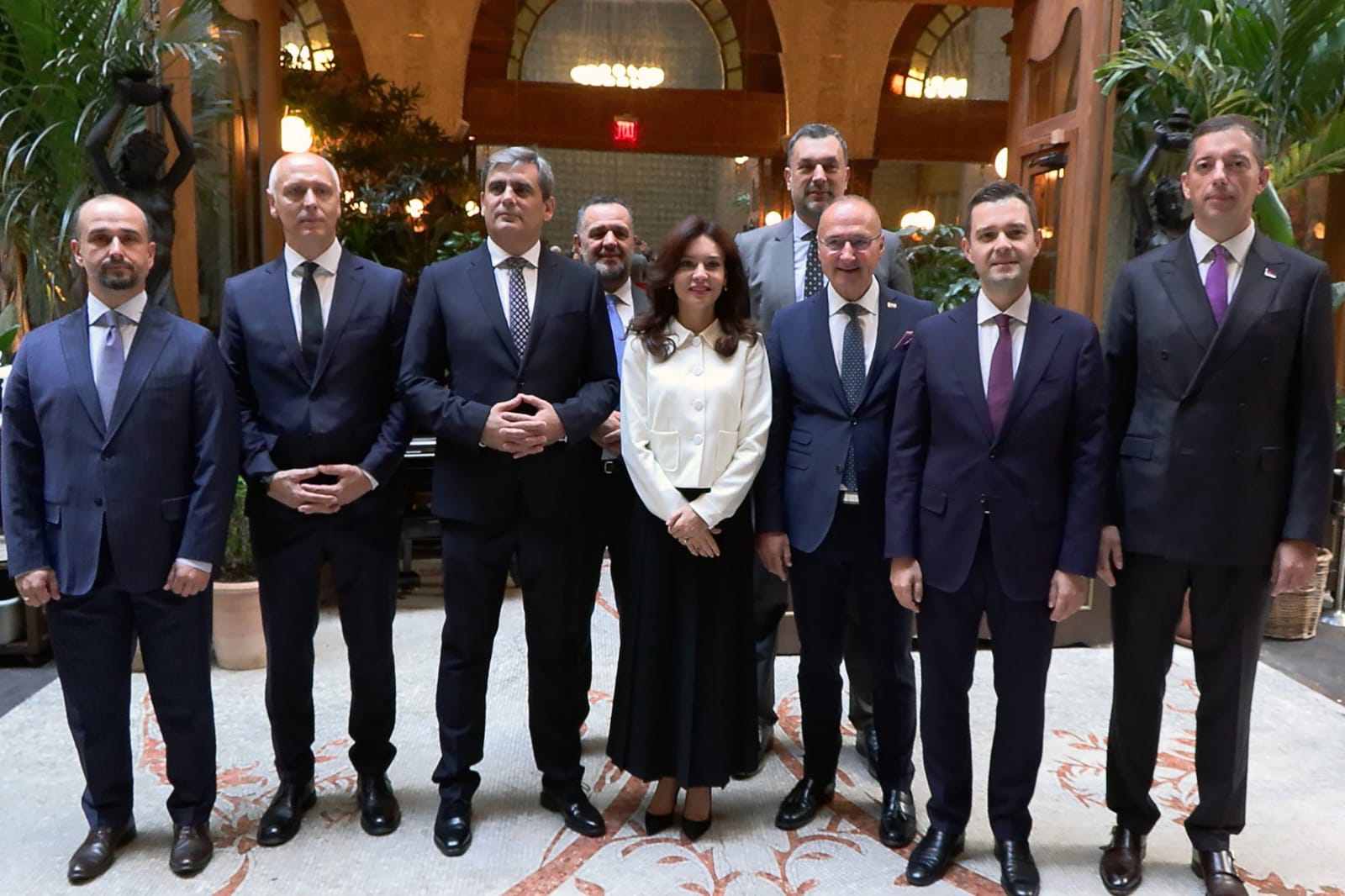
AII Foreign Ministers’ Informal Working Breakfast on the margins of the 80th UN General Assembly - 22 September, New York
On September 22nd, on the sidelines of the 80th session of the United Nations General Assembly in New York, the first meeting of the Ministers of Foreign Affairs of the Adriatic-Ionian Initiative (AII) took place - an event that represents a historic moment and a confirmation of the shared commitment to regional cooperation, European integration and constructive multilateralism. The meeting was organized by the Republic of North Macedonia, which assumed the one-year role of chairman of the AII for the period 2025–2026, and hosted by Minister of Foreign Affairs and Foreign Trade, Timcho Mucunski. In his address, the Minister of Foreign Affairs and Foreign Trade, Timcho Mucunski, highlighted the symbolism of this year, which marks five years since joining the EU Strategy for the Adriatic and Ionian Region (EUSAIR), seven years of membership in AII and 25 years since the signing of the Ancona Declaration – the foundation of this regional initiative. Under the motto "Strengthening regional unity, advancing the European future", the Chairmanship of North Macedonia affirms its commitment to deepening integration and cooperation between member states and their relationship with the European Union. Mucunski stressed the need for a credible EU enlargement process, noting that the Western Balkans must remain a strategic part of the European future. In that context, the priorities of the Chairmanship were presented: strengthening EU integration and regional trust, digital transformation, better infrastructure connectivity, cultural cooperation and support for youth. In a time of global uncertainty, a clear message was sent: "Unity is our strength, and European integration - a common goal."
Read more: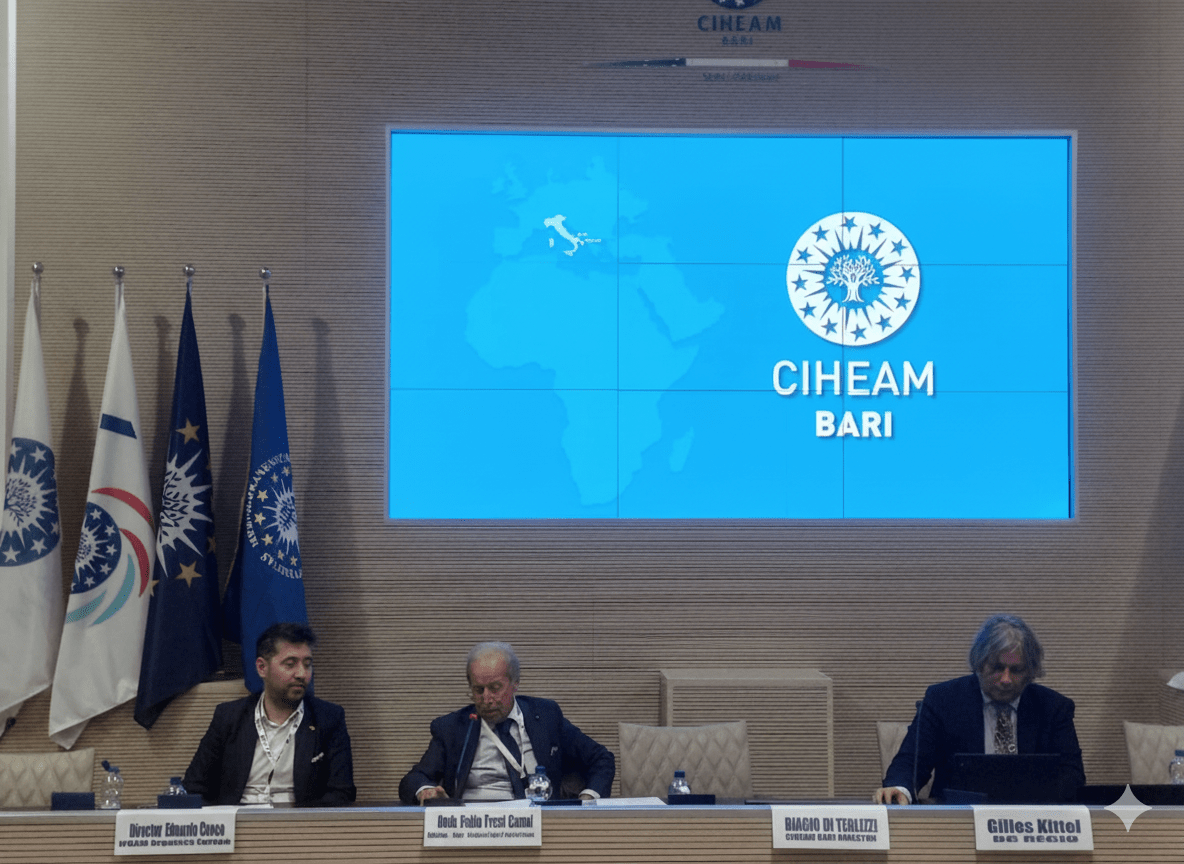
Sustainable and Innovative Food Systems: The Mediterranean Diet as a Tool for Tourism and Local Development in EUSAIR Communities - 29–30 September 2025, Bari
On 29–30 September 2025, the CIHEAM Bari Campus hosted the international workshop “Sustainable and Innovative Food Systems: The Mediterranean Diet as a Tool for Tourism and Local Development in EUSAIR Communities”, organized by the EUSAIR Presidency of North Macedonia, CIHEAM Bari, DG REGIO, and the European Grouping of Territorial Cooperation Platform (EGP), in cooperation with DG AGRI, DG GROW and DG MOVE.
Read more:
CHAIRMANSHIP
JUNE 2025
MAY 2026

